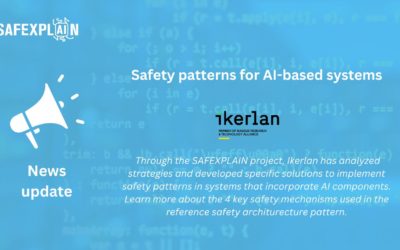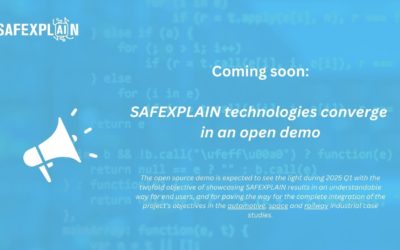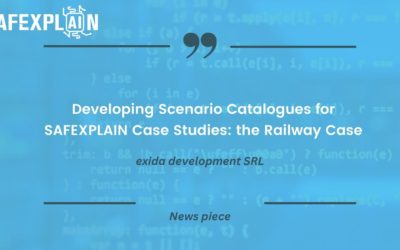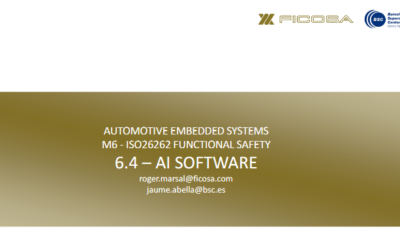SAFEXPLAIN: From Vision to Reality

AI Robustness & Safety

Explainable AI

Compliance & Standards

Safety Critical Applications
THE CHALLENGE: SAFE AI-BASED CRITICAL SYSTEMS
- Today’s AI allows advanced functions to run on high performance machines, but its “black‑box” decision‑making is still a challenge for automotive, rail, space and other safety‑critical applications where failure or malfunction may result in severe harm.
- Machine- and deep‑learning solutions running on high‑performance hardware enable true autonomy, but until they become explainable, traceable and verifiable, they can’t be trusted in safety-critical systems.
- Each sector enforces its own rigorous safety standards to ensure the technology used is safe (Space- ECSS, Automotive- ISO26262/ ISO21448/ ISO8800, Rail-EN 50126/8), and AI must also meet these functional safety requirements.
MAKING CERTIFIABLE AI A REALITY
Our next-generation open software platform is designed to make AI explainable, and to make systems where AI is integrated compliant with safety standards. This technology bridges the gap between cutting-edge AI capabilities and the rigorous demands for safety-crtical environments. By joining experts on AI robustness, explainable AI, functional safety and system design, and testing their solutions in safety critical applications in space, automotive and rail domains, we’re making sure we’re contribuiting to trustworthy and reliable AI.
Key activities:
SAFEXPLAIN is enabling the use of AI in safety-critical system by closing the gap between AI capabilities and functional safety requirements.
See SAFEXPLAIN technology in action
CORE DEMO
The Core Demo is built on a flexible skeleton of replaceable building blocks for Interference, Supervision or Diagnoistic components that allow it to be adapted to different secnarios. Full domain-specific demos are available in the technologies page.
SPACE
Mission autonomy and AI to enable fully autonomous operations during space missions
Specific activities: Identify the target, estimate its pose, and monitor the agent position, to signal potential drifts, sensor faults, etc
Use of AI: Decision ensemble
AUTOMOTIVE
Advanced methods and procedures to enable self-driving carrs to accurately detect road users and predict their trajectory
Specific activities: Validate the system’s capacity to detect pedestrians, issue warnings, and perform emergency braking
Use of AI: Decision Function (mainly visualization oriented)
Safety patterns for AI-based systems
Through the SAFEXPLAIN project, Ikerlan has analyzed strategies and developed specific solutions to implement safety patterns in systems that incorporate AI components. Learn more about the 4 key safety mechanisms used in the reference safety architurecture pattern.
Coming Soon! SAFEXPLAIN technologies converge in an open demo
As the project enters into its 27th month, releases for most technologies are already available and undergoing the last steps towards completing their integration.To demonstrate the SAFEXPLAIN approach, project partners are working towards creating an open source demo...
Developing Scenario Catalogues for SAFEXPLAIN Case Studies: the Railway Case
Part of Exida developnet SRL’s work in the SAFEXPLAIN project includes developing a Catalogue of Scenarios and Test Cases for each case study. These scenarios are performed in either a real or simulated testing environment.
BSC talks Functional Safety at UPC Automotive Embedded Systems course
First slide of training course module given by SAFEXPLAIN coordinator, Jaume Abella and co-presenter Roger Marsal The Technical Unversity of Catalunya hosted a course on "Automotive Embedded Systems" directed at Master´s students coming from the disciplines of...
Exida Development SRL Invited to Speak at InnoVEX 2024
SAFEXPLAIN partner, Carlo Donzella, from Exida Development SRL, has been invited to deliver the first keynote speech of the EV Era Forum session, as part of the 2024 InnoVEX Startup Exhibition, the Innovation Hub of Asia. The event will take place from 4-7 June 2024....
SAFEAI Workshop at 2024 Ada-Europe Conference
SAFEXPLAIN project partners will participate in the 28th Ada-Europe International Conference on Reliable Software Technologies. This conference represents a leading international forum for providers, practitioners, and researchers in reliable software technologies....








